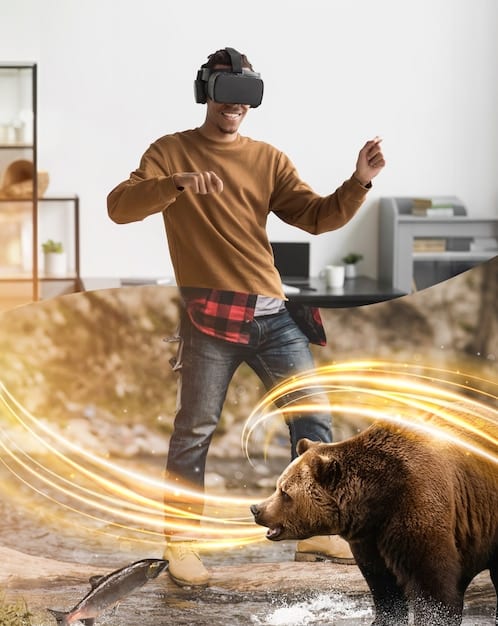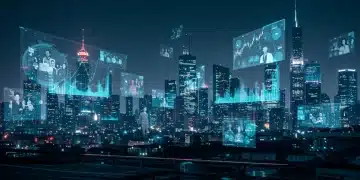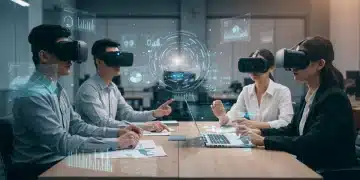Metaverse Job Market: Top Skills in Demand by Q3 2025

By Q3 2025, the metaverse job market will prioritize skills in AR/VR development, blockchain technology, AI, 3D modeling, and cybersecurity to create immersive and secure virtual experiences.
The emergence of the metaverse is not just a technological novelty; it’s rapidly transforming various industries and creating a new frontier for employment. The Metaverse Job Market: Which Skills Will Be in Highest Demand by Q3 2025? This article delves into the crucial skills that will dominate the metaverse job landscape, guiding individuals and organizations in preparing for this digital revolution.
Understanding the Metaverse and Its Impact on the Job Market
The metaverse, a persistent, shared, 3D virtual world, is poised to revolutionize how we work, interact, and transact. Understanding its foundational elements is crucial to grasp its impact on the job market. As the metaverse expands, it necessitates a workforce equipped with specialized skills to build, maintain, and secure these virtual environments.
From creating immersive experiences to ensuring data privacy, the metaverse job market demands a unique blend of technical and creative talents.
Key Components of the Metaverse
The metaverse is not a single entity but a convergence of various technologies that create a seamless and engaging virtual experience.
- Virtual and Augmented Reality (VR/AR): These technologies provide the visual and interactive interfaces that allow users to immerse themselves in the metaverse.
- Blockchain Technology: Blockchain enables secure and transparent transactions, powering digital ownership and the creation of decentralized economies within the metaverse.
- Artificial Intelligence (AI): AI drives intelligent avatars, personalized experiences, and efficient content creation within the metaverse.
- 3D Modeling and Design: Creating realistic and engaging virtual environments requires skilled 3D modelers and designers.
Understanding these components is essential for identifying the skills that will be in high demand in the metaverse job market by Q3 2025.
In conclusion, the metaverse’s expansive nature necessitates a diverse skill set to develop, maintain, and secure its virtual environments, highlighting the importance of understanding its key components for navigating the evolving job market.
The Growing Demand for AR/VR Developers
Augmented Reality (AR) and Virtual Reality (VR) are the cornerstones of immersive metaverse experiences. The demand for skilled AR/VR developers is skyrocketing as companies race to create engaging and interactive virtual environments. These developers are responsible for designing, building, and optimizing the user experience within the metaverse.
Their expertise is critical for bringing the metaverse to life, making it a highly sought-after skill in the future job market.
Essential Skills for AR/VR Developers
Becoming a successful AR/VR developer requires a combination of technical expertise and creative thinking.
- Proficiency in Unity and Unreal Engine: These are the leading game development platforms used to create interactive VR/AR experiences.
- Strong Programming Skills: Languages like C#, C++, and Python are essential for scripting and implementing complex interactions within VR/AR environments.
- Understanding of 3D Modeling and Animation: Creating realistic and visually appealing VR/AR experiences requires knowledge of 3D modeling and animation techniques.
- User Interface (UI) and User Experience (UX) Design: Designing intuitive and engaging interfaces is crucial for creating enjoyable VR/AR experiences.
These skills equip developers to create immersive and user-friendly metaverse applications.

AR/VR developers are at the forefront of creating the metaverse, making their skills pivotal to its growth and adoption. By Q3 2025, their expertise will be even more crucial as the demand for immersive virtual experiences continues to rise.
The Critical Role of Blockchain Experts in the Metaverse
Blockchain technology is the backbone of secure and transparent transactions within the metaverse. It enables digital ownership, the creation of decentralized economies, and the management of digital assets. Blockchain experts are essential for building and maintaining these systems, ensuring the integrity and security of metaverse transactions.
Their role is critical for establishing trust and enabling new economic models within the metaverse.
Key Responsibilities of Blockchain Experts
Blockchain experts play a vital role in designing, implementing, and securing blockchain-based systems within the metaverse.
- Developing Smart Contracts: Creating self-executing contracts that automate transactions and enforce agreements within the metaverse.
- Implementing Blockchain Security Measures: Protecting against fraud, hacks, and other security threats within the metaverse’s blockchain infrastructure.
- Managing Digital Assets: Overseeing the creation, distribution, and management of digital assets like NFTs (Non-Fungible Tokens) within the metaverse.
- Ensuring Interoperability: Connecting different blockchain networks and ensuring seamless asset transfer between them.
These responsibilities are critical for maintaining a secure and functional metaverse ecosystem.
Blockchain experts are vital for ensuring the security, transparency, and functionality of metaverse transactions and digital asset management. Their expertise will be in high demand by Q3 2025 as the metaverse economy continues to expand.
Artificial Intelligence (AI) Shaping the Metaverse Experience
Artificial Intelligence (AI) is transforming the metaverse by enabling personalized experiences, intelligent avatars, and efficient content creation. AI-powered systems can analyze user behavior, generate realistic avatars, and automate various tasks, enhancing the overall metaverse experience. The demand for AI specialists is growing as companies seek to leverage AI to create more engaging and interactive virtual worlds.
AI is crucial for making the metaverse more dynamic, personalized, and efficient.
Applications of AI in the Metaverse
AI has numerous applications within the metaverse, each contributing to a more immersive and personalized experience.
- Creating Intelligent Avatars: AI can generate realistic and expressive avatars that respond to user commands and emotions.
- Personalizing User Experiences: AI algorithms can analyze user data to tailor content, recommendations, and interactions to individual preferences.
- Automating Content Creation: AI can assist in generating 3D models, textures, and other virtual assets, accelerating the content creation process.
- Enhancing Natural Language Processing (NLP): AI-powered NLP systems can enable more natural and intuitive communication between users and virtual entities.

AI specialists are essential for developing and implementing these AI-driven solutions, making their skills highly valuable in the metaverse job market by Q3 2025.
The Art and Science of 3D Modeling and Design
Creating visually stunning and immersive virtual environments requires skilled 3D modelers and designers. These professionals are responsible for crafting the buildings, landscapes, characters, and objects that populate the metaverse. Their expertise is crucial for creating engaging and realistic virtual worlds that attract and retain users.
Without talented 3D modelers and designers, the metaverse would lack the visual appeal necessary for mainstream adoption.
Essential Skills for 3D Modelers and Designers
Being a successful 3D modeler and designer requires a blend of artistic talent and technical proficiency.
- Proficiency in 3D Modeling Software: Tools like Blender, Maya, and 3ds Max are essential for creating detailed and realistic 3D models.
- Knowledge of Texturing and Shading: Applying textures and shading to 3D models to create realistic and visually appealing surfaces.
- Understanding of Game Design Principles: Designing virtual environments that are both visually appealing and functional for gameplay or other interactive experiences.
- Creative Storytelling: Crafting virtual environments that tell a story and evoke emotions in users.
These skills enable 3D modelers and designers to bring the metaverse to life with stunning visuals and immersive environments.
3D modelers and designers are at the heart of creating visually rich and engaging metaverse environments. Their skills will be in high demand by Q3 2025 as the metaverse continues to expand and evolve.
The Increasing Need for Cybersecurity Experts in the Metaverse
As the metaverse becomes more integrated into our daily lives, the need for robust cybersecurity measures intensifies. Cybersecurity experts are responsible for protecting virtual assets, ensuring data privacy, and preventing cyberattacks within the metaverse. Their role is critical for maintaining the trust and security necessary for the metaverse to thrive.
Without strong cybersecurity measures, the metaverse would be vulnerable to fraud, theft, and other malicious activities.
Key Responsibilities of Cybersecurity Experts
Cybersecurity experts play a vital role in safeguarding the metaverse from a variety of threats.
- Developing Security Protocols: Implementing security measures to protect virtual assets, data, and user identities within the metaverse.
- Conducting Vulnerability Assessments: Identifying and addressing potential security weaknesses in metaverse platforms and applications.
- Responding to Security Incidents: Investigating and mitigating cyberattacks, data breaches, and other security incidents within the metaverse.
- Ensuring Compliance with Data Privacy Regulations: Adhering to data privacy laws and regulations to protect user information within the metaverse.
These responsibilities are crucial for maintaining a secure and trustworthy metaverse environment.
Cybersecurity experts are essential for protecting the metaverse from cyber threats and ensuring the privacy and security of its users. Their expertise will be in high demand by Q3 2025 as the metaverse becomes a more integral part of our lives.
| Key Area | Brief Description |
|---|---|
| 💻 AR/VR Development | Creating immersive virtual experiences with Unity and Unreal Engine. |
| 🛡️ Blockchain Security | Securing digital assets and transactions using blockchain technology. |
| 🧠 AI Integration | Personalizing user experiences and automating content creation. |
| 🎨 3D Modeling | Designing visually stunning virtual environments and objects. |
Frequently Asked Questions (FAQ)
▼
The metaverse is a persistent, shared, 3D virtual world where users can interact with each other, engage in activities, and transact using digital assets. It combines elements of virtual reality, augmented reality, and the internet.
▼
AR/VR development is crucial because it provides the immersive interfaces that allow users to experience the metaverse visually and interactively. It enables the creation of engaging virtual environments and applications.
▼
Blockchain technology enhances the metaverse by providing secure and transparent transactions, enabling digital ownership, and creating decentralized economies. It ensures the integrity and security of virtual assets.
▼
AI personalizes experiences, creates intelligent avatars, and automates content creation, making the metaverse more dynamic and user-friendly. AI algorithms can tailor content and interactions to individual preferences.
▼
Cybersecurity is crucial for protecting virtual assets, ensuring data privacy, and preventing cyberattacks within the metaverse. It maintains the trust and security necessary for its continued growth and adoption.
Conclusion
As we look towards Q3 2025, it’s clear that the metaverse job market will be shaped by the demand for specialized skills in AR/VR development, blockchain technology, AI, 3D modeling, and cybersecurity. Professionals who invest in developing these skills will be well-positioned to thrive in this emerging digital landscape. By understanding the key trends and preparing for the future, individuals and organizations can unlock the immense potential of the metaverse.





